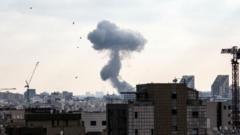As the Trump administration faces backlash for recent airstrikes on Iran, protests erupted in over a dozen cities, uniting people in opposition to further U.S. military involvement while expressing dissatisfaction with the Iranian government.
Nationwide Protests Erupt Against U.S. Airstrikes on Iran

Nationwide Protests Erupt Against U.S. Airstrikes on Iran
Spontaneous demonstrations spanning across multiple U.S. cities reflect widespread dissent against military actions in Iran, highlighting a complex view of the situation.
Protests erupted in more than a dozen cities across the United States on Sunday, driven by opposition to the Trump administration's recent airstrikes on Iran. The demonstrations saw varying levels of participation, with some cities drawing hundreds and others only a handful of protesters. In stark contrast to previous large-scale protests against the administration, termed the "No Kings" protests, turnout for this weekend's rallies was notably lower.
Among the cities where protests took place included New York, Boston, Chicago, Washington D.C., and Los Angeles. These rallies were organized quickly, labeled by their planners as "emergency mobilizations" in reaction to the escalation of military action. Many demonstrators waved Iranian flags and displayed signs reading “No War in Iran!” expressing a collective call for peace and non-intervention.
In Washington D.C., approximately 200 individuals congregated near the White House to express their discontent, including veterans like Ron Carmichael, 78, who criticized the president's leadership style. In Chicago, over 200 people voiced similar concerns, with former Iranian political prisoner Ali Tarokh expressing grave worries about the impact of airstrikes on any prospective democratic transition in Iran.
Protesters articulated a range of perspectives, denouncing the Iranian regime while simultaneously opposing U.S. military involvement. Many participants linked the escalating conflict to existing hardships faced by Palestinians in Gaza, with demonstrators advocating for peace and an end to violence. Noor Abdel-Haq, a young nurse from Los Angeles, emphasized the need for humanity over further casualties, citing her family ties to communities affected by the turmoil.
In Richmond, Virginia, Violeta Vega, a leader of the Party for Socialism and Liberation, rallied a small group in chanting demands for funding for jobs and education instead of military expenditures. Observing the protests, Vega noted the empowering atmosphere conducive to collective action.
Contributions from reporters across various cities enriched the understanding of this unfolding situation, reflecting a tapestry of sentiments from advocates pushing for peace and accountability in foreign policy.





















